In fiction, religion is often cast as technology’s dark other: irrational, tradition-bound, and baroquely complex. Speculative fiction writers can’t look away. If technology represents humanity’s transcendence through reason, religion implies its eternal submission to mystical entities. But SFF tends to be conflicted about its imaginary religions. Fictional religions are often anti-science, they attract charlatans, they prey on ignorance—and yet there’s usually a kernel of real mystery at their heart, and the workings of the religion are often the coolest things about a book. Perhaps it’s no surprise. After all, sci-fi and fantasy writers create entire worlds; many of them feel that no imaginary world would be complete without an imaginary religion.
Here are five of my favorites.
H.P. Lovecraft, “The Call of Cthulhu”
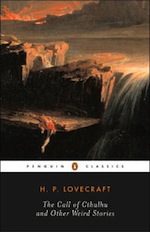 Lovecraft’s bizarre cult of Louisiana yokels worshipping a malevolent, vaguely reptilian alien is the most influential imaginary religion, with the possible exception of Frank Herbert’s space Islam. This is religion at its anti-humanist extreme: the veneration of a being sublimely indifferent to anything of merely human scale. The most disturbing aspect of the tale, to me, is Lovecraft’s evocation of a religion without even a shred of hope for an afterlife or salvation. Just to know that Great Cthulhu “waits dreaming” is enough…
Lovecraft’s bizarre cult of Louisiana yokels worshipping a malevolent, vaguely reptilian alien is the most influential imaginary religion, with the possible exception of Frank Herbert’s space Islam. This is religion at its anti-humanist extreme: the veneration of a being sublimely indifferent to anything of merely human scale. The most disturbing aspect of the tale, to me, is Lovecraft’s evocation of a religion without even a shred of hope for an afterlife or salvation. Just to know that Great Cthulhu “waits dreaming” is enough…
Gene Wolfe, The Book of the Long Sun
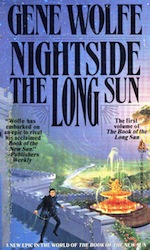 Leave it to Wolfe to create the most complex and profound imaginary religion. In fact there are not one but two religions in the world of the gigantic generation spaceship on which Wolfe’s tetralogy takes place. (The “long sun” of the title refers to the glowing strip that provides illumination for the residents of this Massachusetts-sized starfarer.) The first religion takes the form of a kind of Greek pantheon based on the archived personalities of the family of the tyrant who originally built the ship. The second is centered on a mysterious god known as “the Outsider.” Given what we know about Wolfe’s own Catholic faith, the book presents us with a classically Wolfean paradox. Do the beliefs and rituals that slowly grow up around The Outsider constitute an imaginary religion with a real god?
Leave it to Wolfe to create the most complex and profound imaginary religion. In fact there are not one but two religions in the world of the gigantic generation spaceship on which Wolfe’s tetralogy takes place. (The “long sun” of the title refers to the glowing strip that provides illumination for the residents of this Massachusetts-sized starfarer.) The first religion takes the form of a kind of Greek pantheon based on the archived personalities of the family of the tyrant who originally built the ship. The second is centered on a mysterious god known as “the Outsider.” Given what we know about Wolfe’s own Catholic faith, the book presents us with a classically Wolfean paradox. Do the beliefs and rituals that slowly grow up around The Outsider constitute an imaginary religion with a real god?
Alastair Reynolds, Absolution Gap
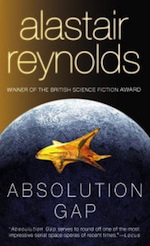 Reynolds is one of the best world-builders in sci fi, and what he captures best is the look of history. Too many writers create streamlined technological worlds. They forget the strange thing called the past, which causes the objects and practices of a culture to rise from primordial time like stalagmites. The functions of a realistic imagined world’s things should come encrusted with the husks of previous technological stages, earlier cultures, obsolete knowledges. In this novel Reynolds brings us to the ice planet Hela, where we encounter a train of massive vehicles known as Cathedrals, which endlessly circle the planet, tracking the movement of a mysterious—and occasionally disappearing—gas giant across the sky. Gradually we learn the history of these fantastic Cathedrals and the religion they support, which, in fine baroque space opera fashion, involves indoctrination viruses, alien cloaking technology, and a mad genius founder.
Reynolds is one of the best world-builders in sci fi, and what he captures best is the look of history. Too many writers create streamlined technological worlds. They forget the strange thing called the past, which causes the objects and practices of a culture to rise from primordial time like stalagmites. The functions of a realistic imagined world’s things should come encrusted with the husks of previous technological stages, earlier cultures, obsolete knowledges. In this novel Reynolds brings us to the ice planet Hela, where we encounter a train of massive vehicles known as Cathedrals, which endlessly circle the planet, tracking the movement of a mysterious—and occasionally disappearing—gas giant across the sky. Gradually we learn the history of these fantastic Cathedrals and the religion they support, which, in fine baroque space opera fashion, involves indoctrination viruses, alien cloaking technology, and a mad genius founder.
Margaret Atwood, The Handmaid’s Tale
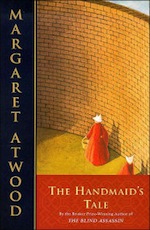 Ok, this religion is only partly imaginary. Atwood’s dystopian future society does worship Jesus. But the land of Gilead mixes its Christianity with a proto-steampunk fetish for Victorian times, a patriarchal communism (“from each according to her ability, to each according to his needs”), and a completely unhinged attitude towards sex. When it’s impregnation time, for example, the wife holds the handmaiden’s hands as the latter’s field is plowed by the elderly master on a giant canopy bed. While this novel clearly takes aim at the Evangelical movement of the nineteen eighties, the weird touches Atwood adds to her imaginary religion betray that fascination with religion’s uncanny logic that partially seduces even the sternest critic of faith.
Ok, this religion is only partly imaginary. Atwood’s dystopian future society does worship Jesus. But the land of Gilead mixes its Christianity with a proto-steampunk fetish for Victorian times, a patriarchal communism (“from each according to her ability, to each according to his needs”), and a completely unhinged attitude towards sex. When it’s impregnation time, for example, the wife holds the handmaiden’s hands as the latter’s field is plowed by the elderly master on a giant canopy bed. While this novel clearly takes aim at the Evangelical movement of the nineteen eighties, the weird touches Atwood adds to her imaginary religion betray that fascination with religion’s uncanny logic that partially seduces even the sternest critic of faith.
Neal Asher, Dark Intelligence
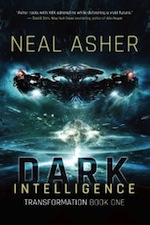 There are two basic ways to be against religion. You can think religion is bad because it holds humans back from fulfilling their great potential. Or you can think religion is bad because it shows how humans are bad, petty, deluded creatures, incorrigibly prone to doing very stupid things. Asher is the second kind of anti-religion writer. The utopian side of his Polity universe is ruled by benign A.I.’s. The dark side, explored by this novel, takes place in a demilitarized zone between the AI and human Polity, and a voracious, warmongering empire of giant alien insects known as the Prador. A kind of religion has sprung up among some of the human inhabitants of this zone, focused on worshipping and imitating the Prador. Adherents engage in incredibly costly and debilitating body modification surgery to look more like the beings they imitate, and flock to a world rumored to contain a buried Prador ship. The Prador themselves, meanwhile, absolutely loathe all humans, and delight in killing them. A subplot shows the benevolent AI’s trying to save some of the Prador worshippers from the murderous instincts of their gods. If you’ve always kind of thought that Jonathan Edwards’ “Sinners in the Hands of an Angry God” was a great sci fi premise, then Asher is the writer for you.
There are two basic ways to be against religion. You can think religion is bad because it holds humans back from fulfilling their great potential. Or you can think religion is bad because it shows how humans are bad, petty, deluded creatures, incorrigibly prone to doing very stupid things. Asher is the second kind of anti-religion writer. The utopian side of his Polity universe is ruled by benign A.I.’s. The dark side, explored by this novel, takes place in a demilitarized zone between the AI and human Polity, and a voracious, warmongering empire of giant alien insects known as the Prador. A kind of religion has sprung up among some of the human inhabitants of this zone, focused on worshipping and imitating the Prador. Adherents engage in incredibly costly and debilitating body modification surgery to look more like the beings they imitate, and flock to a world rumored to contain a buried Prador ship. The Prador themselves, meanwhile, absolutely loathe all humans, and delight in killing them. A subplot shows the benevolent AI’s trying to save some of the Prador worshippers from the murderous instincts of their gods. If you’ve always kind of thought that Jonathan Edwards’ “Sinners in the Hands of an Angry God” was a great sci fi premise, then Asher is the writer for you.
Michael W. Clune’s new book exploring a childhood shaped by computer games, Gamelife, is out from Farrar, Straus and Giroux. His memoir White Out: The Secret Life of Heroin was chosen as a “Best Book of 2013” by The New Yorker, NPR’s “On Point,” and other venues.










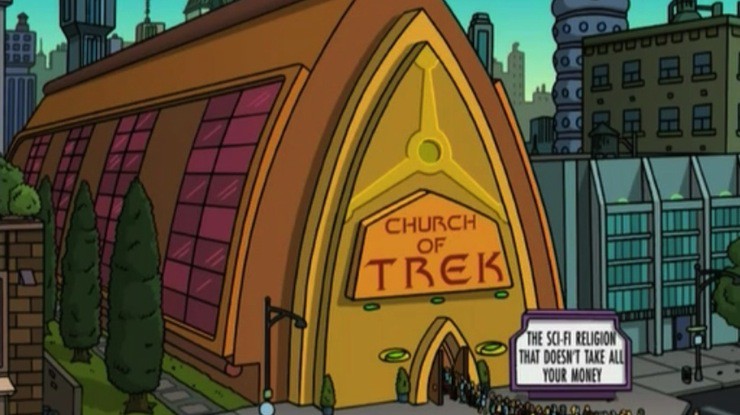
Terry Pratchett, Small Gods.
The planet Grayson in Weber’s Honor Harrington. Shows the good and the bad.
Vorinism in The Way of Kings and Words of Radiance… whose religion is actually founded on reality, but morphs later on. The Almighty seems to actually exist… though I haven’t finished Words of Radiance yet, so no spoilers.
I’m genuinely surprised that this list doesn’t include Stranger in a Strange Land considering how much of the book focuses on the created religion.
Any book by Brandon Sanderson would go great here; it’s unfortunate that he didn’t get a mention.
@3 Also Heinlein’s THE DAY AFTER TOMORROW (a.k.a. SIXTH COLUMN), in which a surviving military research unit “invents” a religious sect to use as a cover for organizing a resistance to a conquering power.
Personally I’ve always had a soft spot for the Slag-Blah Church of The Winslow and their militant agnostic position.
Bokononism from Vonnegut’s Cat’s Cradle. That’s a great one, sadly missed here. And so it goes.
Chiming in with EarthSeed from Octavia Butler’s Parable-novels.
Lois McMaster Bujold’s Chalion series.
Megan Whelan Turner’s Sounis/Attolia/Eddis series.
Also from Vonnegut(The Sirens of Titan), and my favorite fake religion: The Church of God the Utterly Indifferent
How is it that no one has mentioned “Dune” yet?????
Would have been first on *my* list ;)
I’ve always been partial to the Machine Religion used in James Luceno’s The big empty. In that book’s universe, Humanity invents a new religion in order to keep the A.I.s under control, the religion of the Machrist. Instead of hacking into an AI for withheld data, you just threaten the AI with eternal damnation unless it confesses it’s sins (and divulges the information) to a priest/analyst. Very interesting story, and I’m surprised that the novel has been so overlooked by fans of space operas.
My first thought was Lois Bujold’s Chalion books, a very well constructed world where gods intervene in the world.
My second thought was American Gods, although upon further consideration, American Gods was more about gods no longer supported by religions than it was about religions.
How dare you say Cthulhu is “imaginary”?! *shakes trident* Eh, you can do that. It’s Dagon I follow.
As Atwood-created religions go, I’m partial to the God’s Gardeners of the MaddAddam trilogy — exuberant yet pragmatic worshipers of the biosphere, rooted in a grimly realistic dystopia which they hope to destroy outlive. I love their hymns, now in animated form on YouTube. Other religions in that series include the PetroBaptists and the Church of PetrOleum (who quite blatantly worship oil) and the sect-whose-name-I-forgot which tried to create a Peaceable Kingdom by crossbreeding lions and sheep (having the lion literally lie with the lamb in a hilarious confusion of cause and effect).
Zenna Henderson, “The People”
Diane Duane’s The Middle Kingdoms (The Door Into…/Tale of the Five series)
N, K Jemisn’s “Dreamblood” duology, featuring a religion serving the Goddess of Dreams and based on dream magic. With ninja priests!
The religious thread in The Goblin Emperor was interesting, too.
I was quite impressed by the Church of the Evolved Lamb in John Scalzi’s The Android’s Dream. The church is based on the prophecies of a scam artist, but despite knowing this church members are still devoted to making those prophecies come true. I appreciate a religion with that sort of clear-eyed view of its founding and purpose.
How about Hyperion Cantos’s born-again Christianity ??
And then there’s the First Forgotten One, the Second Forgotten One, and the Third Forgotten One, and the message sent back by the Rat, the Copt and the Robot … all from Cordwainer Smith’s world of the Instrumentality of Mankind …
and have we forgotten the Sign of the Locust from Viriconium? Killing is all dead world! Blork! I can see you’re an airboatman … Septemfascia! Blork!
How is it that nobody’s mentioned the religion in Kristine Kathryn Rusch’s Fey series? The Islander religion that has been established specifically to thwart magic?
And then I can vividly remember worshipping Akhanaba, watching Jandol Anganol getting whipped to mortify the spirit, not that it ever worked …
Mercerism from PKD’s Do Androids Dream of Electric Sheep.
The book’s not really ABOUT the religion (although you could argue the book’s about science operating under the trappings of religion), but I did quite like the one in Neal Stephenson’s Anatham, about the Magistrate, the Condemned Man, and the Innocent, where all of our reality is a tale the Condemned Man is spinning out…
R Scott Bakker’s Prince of Nothing series, which plays with most of the religious tropes, covering the syncretist mono/polytheistic Inrithi, the monotheistic Fanim, the various schools of magic, the Mandate who defend against the No-God, and what it is to be a prophet.
Also Evil is Coming, but I’m not entirely convinced the world is worth saving…
How about the sci-fi writer who (allegedly as the result of a bar bet) came up with a religion about evil aliens being trapped in volcanoes and a pseudo-technical pop psychology to go along with it? Clearly that one was my first thought when I saw the “invented religions” title.
Frank Herbert and Bill Ransom’s Pandora Trilogy. The Jesus Incident is a fantastic book that should never have gone out of print!
David Weber’s Safehold series, Book 1 is “Off Armageddon Reef.”
http://www.goodreads.com/book/show/72199.Off_Armageddon_Reef
Chalion, but also Bokonon!
Didn’t Asimov have a fake nuclear power religion in the first Foundation novel? It was a made-up religion used to help those other planets use nuclear power without actually understanding how it worked (so they couldn’t use it against each other in war). I always thought that was clever.
How can you possibly miss Octavia Butler???
I have always enjoyed The Universal Church that appears in many of the works by Alan Dean Foster including his Flix novels. Otherwise, I think that Sarah Zettel’s Fool’s War series manages to bring Islam into sci-fi pretty well. Also, yes, how could you miss talking about the great religion in Dune?
Not one single mention of L. Ron Hubbard’s Scientology that has been turned into a real life cult?
China Mieville’s Kraken is all about cults and small religions deifying and worshipping everything you can imagine– squids, fire, rats– one of my favorites.
What, no mention of David Edding’s Belgariad/Malloreon series? The whole thing’s about conflicting religions!
The thing about Stranger in a Strange Land is that there are two invented religions. Both of them work and both of them are shown to be true, which puts a different spin on Jubal Harshaw’s ridicule of the first one we see.
I vaguely recall a serial in the 60s in Astounding/Analog in which various Earthfolk, only vaguely aware of what each other’s up to, manage to convince the superstitious alien invaders that Earth’s avenging “Grandpa (of us all)” is coming this way. In a thundercloud perhaps. The invaders leave quietly.
How about JRRTolkein? His invented religion is deep and feels very realistic. Makes sense when you consider his background as a phylogist. His mythology feels like something that could actually exist. Bonus points for him creating it as an actual creation mythos for our world. (Endor/ Middle Earth is the past of our world.) The Silmarillion gives you the basics. There are also.several.other faiths that show up, and they also play a role.
Oh, and today’s helpful hint:
When you’ve written your story that includes one or a few made-up religions–at least one that’s clearly “evil”–be sure the folks you submit it to haven’t even the slightest connection to a real-life version of your “evil” one.
I’m glad I stopped to reflect a bit before I submitted my well-turned tale to Ron Hubbard’s Writers of the Future contest. Clearly I’d been dense to how others might take to my heavy use of “clear” and “clearly” in unpleasant situations. And the Herod-like command: “We must clarify that village.”
I’m sure the contest people would’ve been gracious and understanding, but still–
What imaginary world of any substance doesn’t have an imaginary religion or 30?
A Song of Ice and Fire – the Seven, the old gods, the Red God, the sacrifices to the White Walkers, the drowned god…